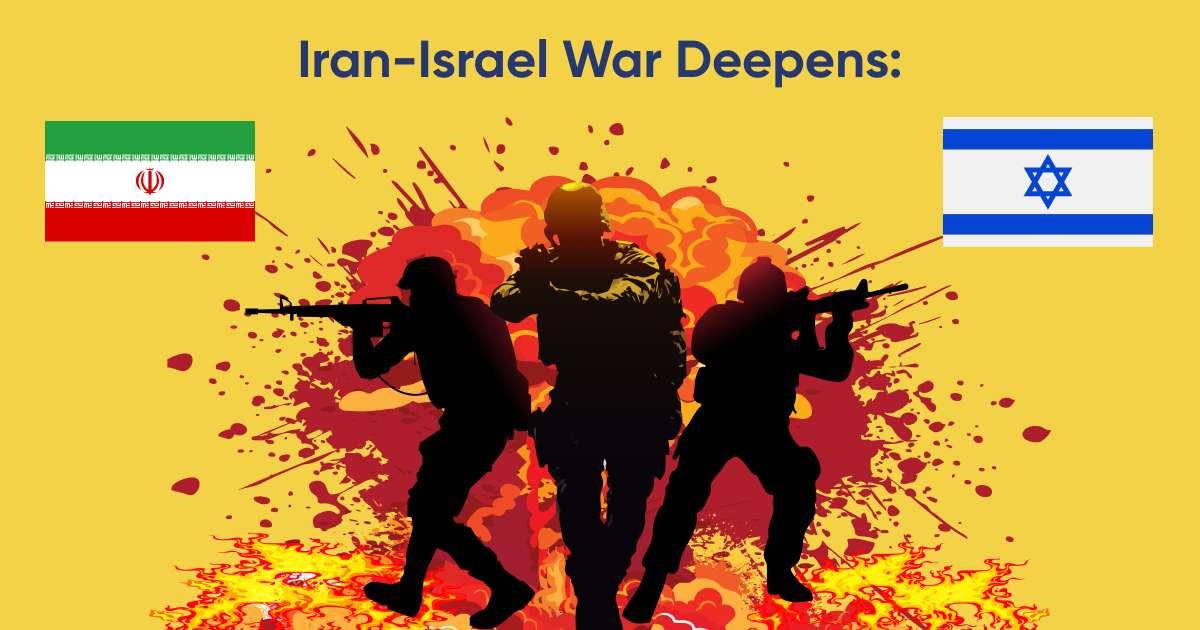As of June 16, 2025, 3:00 AM IST, the Iran-Israel war intensified, with fresh airstrikes reported overnight. The IDF Homefront Command has issued extended security directives for civilians across central and southern Israel. The alert is likely to last through the night. The ongoing escalation is now reshaping global trade flows, disrupting oil movement, and drawing military responses from major powers. Early morning, sirens continued to sound in Tel Aviv and surrounding areas.
Iran-Israel War Strains Global Oil Supply, Trade Routes Face New Threats
The war's direct impact on oil and shipping is mounting. Brent crude jumped to $102 per barrel on June 14, the highest since February 2024, after Iranian missile strikes hit infrastructure near the Strait of Hormuz. Nearly 22 million barrels per day pass through the strait, accounting for 21% of global oil trade, according to the International Energy Agency (IEA). Rising tensions threaten the Red Sea corridor and Hormuz, both critical to merchant vessel movement between Asia, Europe, and the Middle East. If the conflict prolongs, maritime insurance premiums could increase sharply, shipping analysts warn. Freight rates have risen 34% since early June, and shipping firm Maersk reported delays in vessels transiting between the Persian Gulf and Suez Canal.
U.S. and Israeli Military Coordination Escalates as Tehran Hit with Strikes
Military activity surged. Two U.S. Air Force C-17s landed at the Anniston Army Depot in Alabama late on June 15. The depot operates the Anniston Defense Munitions Center (ADMC). The aircraft are suspected to be transporting Patriot or THAAD missile systems bound for Europe. The IDF launched further attacks targeting Iranian command centers near Shiraz and Kermanshah. Israeli F-35I Adir jets and long-range Shavit missiles were deployed overnight. Iran retaliated using Fattah-2 hypersonic missiles and Shahed-197 drones.
Israeli Minister of Defense Yoav Gallant declared, “The IDF will continue its mission until Iranian military infrastructure is neutralized.” Defense Minister Israel Katz stated,
“The arrogant dictator from Tehran has become a cowardly murderer who fires targeted shots at the civilian home front in Israel to deter the IDF from continuing the attack that is collapsing its capabilities. The residents of Tehran will pay the price, and soon.”
Retail Trading Slows as Market Uncertainty Increases
Stock markets remain volatile. The Tel Aviv Stock Exchange posted a 3.6% decline over two sessions, while the NASDAQ Composite dropped by 3.2%. The BSE Sensex fell 1,032 points on June 13 as oil-importing nations brace for inflation pressure. Retail investor activity in Middle Eastern markets has plunged by 27% since June 5, as reported by Tadawul. Trading volume also slowed in Europe, with investors shifting toward safe assets like gold, which rose to $2,550 per ounce.
Civilians Under Threat as Iran-Israel War Hits Home Fronts
The IDF Homefront Command has maintained elevated alerts in Beersheba, Haifa, and Ashdod. Over 240,000 Israelis have experienced power outages due to Iranian cyberattacks on municipal infrastructure. In Iran, 312 civilians have died, mostly in southern regions. UNOCHA recorded 198 fatalities in Israel. Over 45,000 Iranians have fled from southern provinces, fearing fresh Israeli airstrikes. Food prices in both nations are rising fast. Wheat, cooking oil, and vegetables have seen a 21% price hike in urban markets. International aid remains limited due to blocked transport corridors and active hostilities.
Global Diplomacy Faces Breakdown as UN Ceasefire Calls Fail
The UN Security Council remains divided. A draft ceasefire resolution proposed by France and Germany on June 12 was blocked by the permanent members. UN Secretary-General António Guterres urged immediate de-escalation, saying, “Civilians must be protected, and diplomacy must return.”
The Arab League, in an emergency session on June 14 in Cairo, failed to adopt a collective stance. Saudi Arabia and Egypt pushed for peace talks, while Iran’s regional allies refused to compromise. U.S. Secretary of State Antony Blinken reaffirmed military assistance to Israel, while Russia and China pushed for non-intervention. Russia warned of “wider regional instability with global consequences” during the UNSC session on June 13.
Prolonged Conflict May Trigger Global Supply Chain Shock
The Iran-Israel war has entered a dangerous phase. If hostilities extend into Q3 2025, global trade, energy supply, and inflation will face further stress. International logistics companies are revising shipping routes to avoid war zones. Military analysts believe a direct U.S. or NATO deployment could emerge if Iranian attacks expand beyond Israeli territory. With oil prices climbing and global markets under pressure, the ripple effect could reach households worldwide. Focus now shifts to diplomatic engagement and strategic deterrence. World leaders face urgent decisions as military deployments and civilian suffering escalate in tandem.
How the Iran-Israel War Affected Trademark Activity
The Iran-Israel war has slowed trademark activity across affected regions. Trademark offices face delays due to cyberattacks and airstrike disruptions. Many global brands have paused filings in Israel and Iran due to instability and legal uncertainty. Counterfeit activity has increased as enforcement weakens and authorities focus on national defense. Courts have postponed hearings for trademark disputes, delaying legal resolutions. Firms are shifting trademark filings to neutral locations like the UAE and Europe for safety. WIPO is monitoring the conflict and may extend deadlines under force majeure provisions to protect rights.






